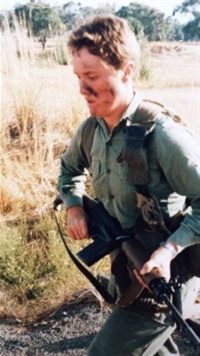Yvonne Sillett’s life changed when she went public about her treatment as a gay woman in the Army. She always thought she was alone.

When Yvonne Sillett gave evidence to the Royal Commission into Defence and Veterans Suicide, it was the proudest day of her life.
She had not heard of DAVLS at the time, so wrote a letter to the Royal Commission last year, little knowing what impact it would have on her – and on others.
“For so many years, I’ve been angry, I’ve been hurt,” she said.
“For years, it was my partners who heard my story, and telling the story at the highest level was so cathartic for me.
“I walked outside the hearing with my wife and the TV cameras were out there – finally after 40 years people are interested in what I have to say.”
Telling her story has not been without cost to her mental health – “I have my good days and my bad days” – but she was astonished to discover that she was far from alone.
Yvonne was always going to join the military, she had no Plan B, coming from a military family where both her parents served in the Navy.
Her adored father later worked for 30 years in the Defence Signals Directorate with a top-secret clearance.
That, and her love of sport, were the motivating factors.
“I was very close to my father, and I knew that he was in this secretive, spy sort of world,” she said.
“Playing sport and finding out about my dad’s life. I didn’t think about anything else except joining the military.”
And when she joined the Royal Australian Signal Corps at the age of 18, the life was everything that she had hoped for.
She represented the Army in a range of sports including basketball, softball, touch football and athletics.
She became a recruiting instructor, and in 1985, she raised the first female recruit course at 1 Recruit Training Battalion Kapooka.
But then disaster struck.
While in the military, she realised that she was gay, but also realised that if word got out, this would be the end of her career – and that of her partner at the time.
In early July 1988, whilst she was working at the Defence Plaza, I received a phone call asking me to come to Victoria Barracks for a `security assessment interview'.
It was the most humiliating experience of her life.
“They informed me that they had been following me for several months,” she detailed in her witness statement.
“They had followed me on a recent trip to Rutherglen with some female friends who were also gay. They said they knew I had visited gay bars.”
She was later told that her security clearance would be downgraded to ‘confidential’ and that she could no longer serve in the Signal Corps.
It wasn’t long before she was left with no option but to elect for discharge.
“I was absolutely shattered. I loved my career and had been known as a trailblazer for women in the Army,” she said.
“It was all I had known, and the rug was yanked from under my feet. The trauma I experienced was up there with losing my mother, and I experienced suicidal thoughts.”
Years past, including 16 years working in the Department of Defence before she and another veteran who lived nearby in Victoria formed the Discharged LGBTI Veterans’ Association.
She is pushing for a national apology and is a member of the Expert Advisory Group at DAVLS.
“It’s so important to have someone there on your side from the get-go,” she said.
“The lawyers at DAVLS will take you through step by step through the process.
“A good friend told me recently that she was sexually assaulted when she served. I’ve known her for 40 years and had no idea.
“I put her in touch with DAVLS and her submission has now gone through to the Royal Commission.”
Transcript
Email us to request a transcript.
Publication date: 23 February 2023
Publication type: AudioPodcast
Language: English